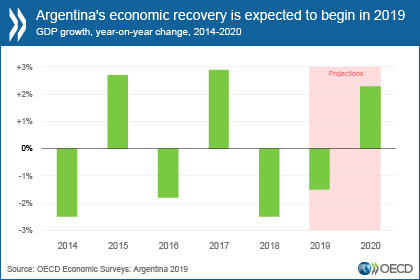Further reforms needed for a stronger and more inclusive Argentine economy
The Argentine economy is expected to begin emerging from its deep recession in 2019, but significant risks remain. Recovery from the crisis will require new efforts to restore confidence, build solid macroeconomic foundations, improve governance, create jobs and ensure that future growth is greener and benefits all Argentinians, according to a new report from the OECD.

The latest OECD Economic Survey of Argentina looks at the factors behind the country’s recent downturn, as well as policies that can lay the foundation for a stronger and more inclusive economy. The Survey projects the economy will contract by 1.5% this year before returning to a 2.3% growth rate in 2020.
“The Argentine economy has extraordinary potential, but economic policies have held back performance,” Mr Pereira said. “The severe economic crisis that unfolded during 2018 has pushed the economy into a deep recession, which requires immediate action to restore confidence and unwind significant fiscal and external imbalances. Looking ahead, the priority will be to speed up the reform process while ensuring that policies are in place to protect the most vulnerable groups and enable a return to stronger and more inclusive growth.”
The Survey shows how fiscal policy can be used to restore confidence, improve macroeconomic performance and promote more inclusive growth. Adherence to fiscal commitments will solidify public finances and convince markets of Argentine authorities’ willingness to resolve serious imbalances accumulated over many years. Remaining fiscal space can be used for well-targeted spending on social transfers to vulnerable groups.
Structural reforms will be key to foster future growth. Reducing domestic regulatory barriers to entrepreneurship and market entry, including at the level of provincial and local governments, will strengthen competition and boost activity. Strengthening the operation and financial autonomy of the anti-corruption office and guaranteeing adequate resource to fulfil its mandate would improve the business environment.
The Survey underlines that Argentina is significantly less integrated into the world economy than other emerging market economies, with high tariff barriers that shield it from international competition and often slow integration into global value chains. To foster Argentina’s integration into the global economy, the Survey highlights the need to reduce tariff and non-tariff barriers, starting with intermediate inputs and capital goods. Reducing trade barriers would raise consumer purchasing power, especially for low-income households, and would reduce firms’ costs, while pushing companies in currently shielded sectors or industries to become more productive.
The Survey recognises that while stronger integration presents large untapped potential for improving the living standards of all Argentinians, it also implies challenges for workers, as jobs may move across firms and industries. Such changes in the structure of the economy are necessary, as many jobs are currently trapped in activities with limited potential for productivity and wage growth. At the same time, policies must support workers in the transition. Ensuring a strong social safety net and bolstering adult training programmes and vocational education are key policy priorities, the Survey said.
Source: Organisation for Economic Co-operation and Development
- 336 reads
Human Rights
Fostering a More Humane World: The 28th Eurasian Economic Summi

Conscience, Hope, and Action: Keys to Global Peace and Sustainability

Ringing FOWPAL’s Peace Bell for the World:Nobel Peace Prize Laureates’ Visions and Actions

Protecting the World’s Cultural Diversity for a Sustainable Future

Puppet Show I International Friendship Day 2020

